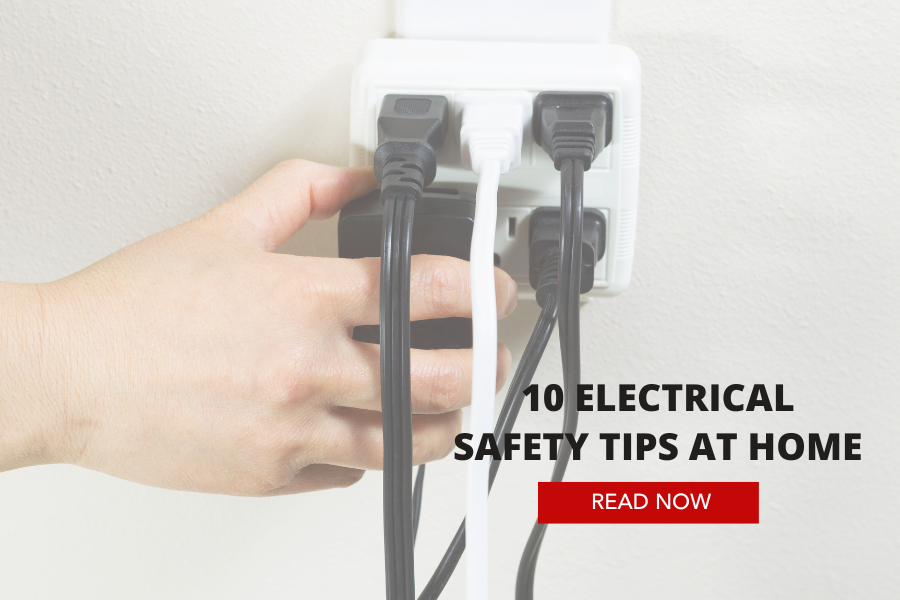Owning a home can make you feel like you’re on top of the world and that you can do anything. It makes you feel powerful. Unfortunately, there is something a bit more powerful than you, and that’s the insane amount of electricity that it takes to power your home. Today we want to talk about that electricity, how to keep it up-to-date, and the 10 things you need to keep in mind as a homeowner.
Now, a word to all of you out there who fancy yourselves as Mr./Ms. Fix-Its: when it comes to electrical matters, it’s best to leave it to the pros. Trust me, you don’t want to be the guy who turns a simple spark into a full-blown blackout. So, without further ado, let’s get to the 10 electrical safety tips at home..
1. Understand and Respect Electricity
Remember, electricity isn’t something to be trifled with. Treat it with the same reverence you would your mother-in-law—keep your distance and you’ll avoid any shocking surprises. It’s likely got more power and influence than you can handle.
2. Use Extension Cords Wisely
Extension cords are like the duct tape of the electrical world—useful in a pinch but never a permanent solution. We promise you that you cannot run the whole house off one extension cord.
3. Install GFCI Outlets in Wet Areas
GFCI outlets, short for Ground Fault Circuit Interrupter outlets, play a crucial role in your home’s electrical system. These outlets are designed to detect abnormalities in electrical currents, such as ground faults or sudden surges. When such issues arise, GFCI outlets automatically cut off power to prevent electric shocks or fires. These are typically installed in areas with exposure to moisture, like bathrooms and kitchens.
4. Childproof Outlets
If you’ve got little ones running around, consider tamper-resistant outlets. Because let’s face it, kids have a knack for finding trouble faster than you can say “electrical hazard.”
5. Keep Flammable Items Away from Outlets
We hope this one isn’t too obvious, but remember that electricity and flammable materials don’t mix— keep those curtains and rugs far away from the outlets. In the event of a short circuit or electrical malfunction, these materials can ignite quickly, potentially leading to a devastating fire.
6. Regularly Inspect and Maintain Electrical Appliances
Your appliances need regular care and maintenance. It’s a lot cheaper to replace a toaster than it is to replace the wall that it sits next to, so don’t wait until it starts smoking before you give it some TLC. Check for signs of wear and tear, such as frayed cords, damaged plugs, or overheating components. You can also ensure that appliances have adequate airflow to prevent overheating and reduce the risk of electrical fires, burning smells, crackling noises or arc noises, arc burns or arc marks. Use a surge protector, it’s a great insurance policy. All smart appliances have microchips that are very sensitive to stray voltage. Surge protection protects your whole electrical system and your electrical devices, such as, hot tubs, computers, refrigerators, washer and dryer, dishwasher, televisions etc.
7. Know Your Home’s Electrical System
Familiarizing yourself with your home’s electrical system is an essential aspect of responsible homeownership. Understanding the layout of your electrical panel or fuse box enables you to effectively manage power distribution throughout your home. In the event of an emergency, knowing how to locate and operate these controls can be invaluable, potentially preventing damage or harm.
8. Educate Everyone in the Home
Remember, it’s not just your own safety on the line—make sure everyone under your roof knows the dos and don’ts of electrical safety. After all, ignorance is only bliss until someone gets zapped.
9. Don’t DIY when it comes to Electrical Repairs
In today’s day and age it’s smart to save a buck and do it yourself. There are a lot of things around the house that can be done without a professional, such as fixing a fence, redoing the kitchen cabinets, but when it comes to electrical repairs, DON”T be a hero. I don’t want to be a Debbie Downer but the truth is 400 people a year get shocked badly from trying their own electrical repairs, 200 of these people die each year.
10. When in Doubt, Consult a Professional
And finally, if all else fails and you find yourself in over your head, swallow your pride and call in the cavalry. The only professional that you should be embarrassed to call is the fire department. Calling an electrician may be the only thing to do, but also the smartest thing to do.
In wrapping up, it’s clear that keeping your home safe from electrical mishaps is all about being smart and proactive. By sticking to the 10 tips we’ve covered here, you’re setting yourself and your family up for a safer living space. Whether it’s respecting the power of electricity, doing regular appliance check-ups, or making sure you’ve got those nifty GFCI outlets installed in the right spots, every little step counts. Owning a home is awesome. But with great power comes great responsibility, and it’s up to you to keep your home, your family, and yourself safe. So, here’s to you, homeowner—you’re doing a heck of a job. Keep up the good work, but more importantly, keep your house up to code.

